You gotta have hope! Mustn’t sit around and mope.
Nothing’s half as bad as
it may appear,
wait till next year and hope.
Image, Joseph Mills. Bootsy Holler.
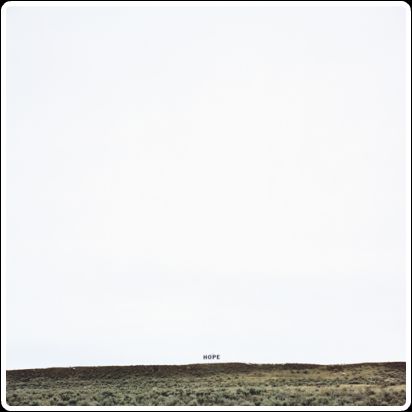
Regina Hackett takes her Art to Go
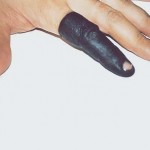
That old grade-school test question - Which of these does not belong? - offers a key to the aesthetics of the expressively hot, as opposed to the classically cool. The hint of crazy within the solid citizen, the blood in the water and the worm in the rose (mortal, guilty) move us in a way that visions of perfection rarely do. In honor of the flaw, a small survey of its recent, robust manifestations. Douglas Gordon Three Inches (Black) 1997 (image via) Susan Robb: Three from the last … [Read More...]
Filed Under: Uncategorized
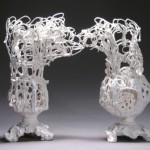
If human history were underwater, Alwyn O'Brien's ceramic vessels could serve as the bleached bones of the Ancien Regime, the decorative drained and dead on a dark sea floor. 4 Descending Notes 2010 Manganese Clay and Glaze 9" x 7" x 5 1/2" Hand-rolled coils make her lacy vessels. Born past their prime, they are in their own weird way pristine. Story of Looking, 2010 Porcelain and glaze, Two Pieces 12 1/2" x 14" x 5" Following Thelonious Monk, she knows how to use the wrong … [Read More...]
Filed Under: Uncategorized
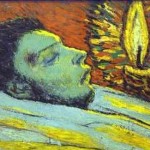
Collectors who hire experts to solve problems that don't exist till help arrives are responsible for the equivalent of bad face lifts on old masters. What the artists intended too frequently recedes under an abrasive cleaning or a deadening layer of varnish. Current practices discourage irreversible interventions. That means John Currin's work is a little safer than artists who preceded him, such as Picasso, although having the money to buy good advice doesn't guarantee it will be heeded. … [Read More...]
Filed Under: Uncategorized
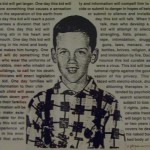
Nice to see David Wojnarowicz (wana-row-vitch) back in the news, making the monkeys dance. It's no surprise that the usual people want to use their deliberate misunderstanding of his work to rally their frightened base. It's also no surprise that the Smithsonian once again proves to be cowardly. Remember its Enola Gay exhibit from 1995? The examination of this country's use of the Atom Bomb started as scholarly and turned into a my-country-right-or-wrong cheering section, after suitable … [Read More...]
Filed Under: Uncategorized
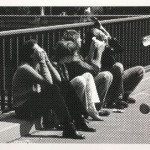
Humans see, humans do: After the first horse drawn on the first cave and the first pot incised with a decorative line, everything became imitation. You don't need a weatherman to know which way that wind blows, or that in the contemporary period, it blows harder. In selecting the 12 artists featured in Image Transfer: Pictures in a Remix Culture, associate Henry curator Sara Krajewski looked for those whose engagements with image recycling make them visual mix masters of note, those who … [Read More...]
Filed Under: Uncategorized
By Regina Hackett Leave a Comment
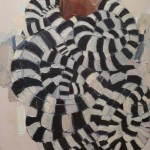
Mequitta Ahuja Wriggle, oil on canvas, 41"X26" 2008. Could have been titled, Medusa takes a nap. Geoffrey Chadsey Welterweight, 2002 Watercolor pencil on rag vellum, tape 57" x 24" Another great Chadsey figure with flowing locks. (Not safe for work.) Lauren Grossman Behold 2003 Iron, wool, steel. 13"x21"x12" Rolls on casters. Mequitta Ahuja, again. Flowback, oil on canvas, 68"X51" 2008 … [Read More...]
Filed Under: Uncategorized
You gotta have hope! Mustn’t sit around and mope.
Nothing’s half as bad as
it may appear,
wait till next year and hope.
Image, Joseph Mills. Bootsy Holler.

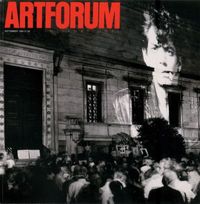 (Click image to enlarge)
(Click image to enlarge)
1. Jen Graves on Christina
Orr-Cahall, soon to be director and CEO of EMP, here. Good piece. What happened two decades ago at the Corcoran still matters. It’s a decision that echoes outward, and 19 years of admirable service at the Norton cannot erase it.
What Graves didn’t do is get inside the decision to cancel the Mapplethorpe show. That’s because Orr-Cahall won’t talk about it. Is there a gag order? What was going on with the Corcoran board? I heard indirectly from a couple of Orr-Cahall’s friends that she was trapped between big-money board members who insisted the show be canceled and the very real fear that the government would cut off all Corcoran funding if the Mapplethorpe show proceeded.
Looks as if she took the bullet for the team. Yes, she did the wrong thing. If she couldn’t proceed, she should have resigned, which is easy to say now.
One thing is clear: EMP blew its introduction. The museum needed to raise the issue and provide a response. Asked and answered. Instead, it counted on lazy or nonexistent press to ignore it.
(Michael Brenson on the 1989 cultural moment here. Richard Lacayo on the economic reality of the fallout here.)
One further thought: Graves compares the odious Helms to Hitler. If Helms had forced unruly artists into labor camps followed by liquidation, it would be a point worth making. Otherwise, it’s an off-putting cliche. The shock value is gone. What’s left is stale overkill. On the other hand, when Tony Curtis compared kissing Marilyn Monroe to kissing Hitler, he scored. The image of kissing refreshed the insult and made it stick.
2. Kenneth Baker on Wayne Thiebaud, here. An insightful Thiebaud review is essential for the Bay Area’s premier newspaper, and Baker came through:
Thiebaud’s early paintings of pastries and other foodstuffs took seriously the roots of still life as subject matter originally meant to domesticate high art for a nascent middle-class audience and market. His pictures did something analogous: They made the esoteric pleasures of brushwork, color and materiality democratically available by pushing parallels between paint and frosting, color and sweetness, intensities of visual and gustatory sensation.
The new paintings use those tactics to disguise a meditation on the surrealism that lurks within all pictorial illusion.
3. David Pagel’s Elias Simé: Eye of the Needle, Eye of the Heart at the Santa Monica Museum of Art, here.
To step into the fantastically jam-packed installation now at the Santa Monica Museum of Art is to step into another world: a nuanced universe suffused with compassion, sensuality and wisdom, a place so far removed from the cold calculations and multi-tasking distractions of life in Los Angeles that it seems you have to be a specialist (or very privileged) to go there.It’s all too easy to see the 60-plus sculptures, 40-odd paintings, seven thrones and five wall reliefs by Ethiopian artist Elias Simé as an anthropologist would: ingenious artifacts from a fully formed culture fundamentally different from our own and probably part of a way of life being squeezed out by global consumerism.
But Elias Simé: Eye of the Needle, Eye of the Heart is nothing of the sort.
4. Edward Winkleman on Julie Evan, here.
The thought that went through my mind as I viewed Julie’s show (in addition to thinking she’s been holding back on the sensuality quotient…these drawings are smokin’ hot) was how sometimes an artist’s accomplishments simply cannot be rushed. It can take just the right combination of life experiences, exposure to other ideas, and simply being in the right place at the right time for things to click. None of which may make sense to even the artist (or be particularly pleasant) at the time, but which definitely results in an eventual accomplishment that enriches our lives.
An oblivious form of regional art criticism pretends that the art in question exists on it own, without reference to the larger world. Reminds me of a derisive little ditty on the philosophy of George Berkeley, pronounced Barkley.
Dr. George Berkeley hinted darkly
If I cannot see you, you cannot be you.
A review of Katherine Gray on Culture Monster is an excellent example of the type. It opens with an observation that might have been supportable 30 years ago:
Katherine Gray works in a medium — glass — that rarely takes center stage in a contemporary art gallery not already given over to craft or design.
Onward to description, followed by more description:
The centerpiece of the show, Forest Glass, is an installation
consisting of a pair of free-standing, clear acrylic shelving units,
each roughly 9 feet tall and around the breadth of a coffee table,
loaded with hundreds of mismatched thrift store glasses.
Good idea, stacked glass. Who has done it before? For starters, Tony Cragg, Louise Bourgeois, Dante Marioni, Josiah McElheny and Ann Gardner. Gardner stacked mismatched thrift-store glass in the 1990s, no examples online. All of these artists, by the way, have shown in contemporary art galleries (and museums) not already given over to craft or design.
From Noise Addicts:
I’ve got 2 large boxes completely full of old cassette tapes (remember those?) in my closet. There are probably over 400 tapes sitting there, degrading, losing their magnetic information, slowly dissolving into silence…
Noise Addicts found an artist who turns played-out tapes into homages to the musicians whose songs were coded into their surfaces.
Portraits in audio tape by Iri5. Click to enlarge. More of her work here.
Dry on left, wet on right: click to enlarge.
Left to right: First row: Joe Biel and Juniper Shuey. Second row: Gretchen Bennett and Susan Robb. Third row: Debra Baxter and Alden Mason. Fourth row: Leo Saul Berk and Claire Cowie. Fifth row: Blake Haygood 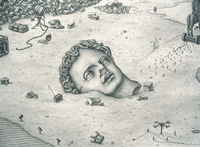
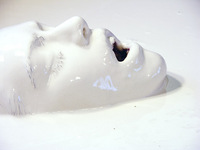 and Darren Waterston.
and Darren Waterston.
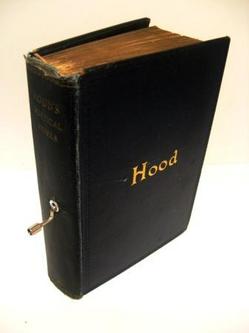 When I was in third grade, finally trusted with my sister’s vintage Nancy Drews, I ate them as I read them; not the whole thing but the crackly margins around the text – yellowed Communion wafers tasty as taco chips.
When I was in third grade, finally trusted with my sister’s vintage Nancy Drews, I ate them as I read them; not the whole thing but the crackly margins around the text – yellowed Communion wafers tasty as taco chips.
Artists do something similar, although to greater acclaim. They destroy books in order to honor them and make them their own.
The Book Borrowers: Contemporary Artists Transforming the Book is at the Bellevue Arts Museum through June 14.
 Although major figures from the art of the book (Anselm Kiefer, Ellen Gallagher, Ann Hamilton, Glenn Ligon, Tim Rollins and the Kids of Survival and Ed Ruscha), are not here, Book Borrowers is studded with gems. From the elaborate to the stark, the best fuse the container with the thing contained. (Click to see larger images.)
Although major figures from the art of the book (Anselm Kiefer, Ellen Gallagher, Ann Hamilton, Glenn Ligon, Tim Rollins and the Kids of Survival and Ed Ruscha), are not here, Book Borrowers is studded with gems. From the elaborate to the stark, the best fuse the container with the thing contained. (Click to see larger images.)
1. Jennifer Khoshbin (Hood)
2. Brian Dettmer (New Book of Knowledge).
Other artists in the show are Noriko Ambe; Brian Dettmer; Long-Bin Chen; Jacquline Rush Lee; James Allen; Gary Berg; Casey Curran; Alan Corkery Hahn; Jane Lackey; Guy
Laramée; Georgia Russell, and
Yuken Teruya.
From Tobi Tobias on her blog, Seeing Things, a lovely, link-free essay on why she loves living in New York. It has no images either. Just the ones she evokes, all over town.
I could try (and probably fail) to match her with an essay on Seattle, but I’ll stick to a question in response: Tobi: Does your bar write you letters?
From The Hideout to its customers:
There are just things that I forget about.
Maybe it’s the booze and the pills. I don’t know, maybe I’m just growing old. I was at the grocery store the other day and bumped into a friend that I’ve know for years. And I open my mouth to say hi and I say “hi….” Fucking blanked out.My eyes got big and I just smiled that dumb, unbelievable smile, the “I can’t believe this shit” smile. And then I bobbed my head and followed it up with a solid “whatcha been up to”, actually being serious, hoping that it connects some dot, triggers something in my brain, gives me a hint.
It’s like driving on empty up a hill- come on, come on, come on- you start talking to your brain like a cheerleader- come on, come on- you can do it. And you know all about them- you know the car that they drive and the name of their girlfriend and the funny looking bookshelf in their living room. Give it to me! Give me the name! Paul- yes, Paul- of course. “Paul it is great to see you.” And then I race for the produce section, repeating his name over and over again, hoping that repetition works. That if I say it enough my applesauce brain will capture it like a bug in amber.
The Dusty 45’s are back tonight – First Thursday. It is free and easy. It’s not a sales pitch, just a reminder of a good thing. So you don’t wake up on Friday morning and go – now I remember! Instead of playing Dig Dug on my iPhone for three hours, I could have been at the Hideout and watched Billy Joe play trumpet and guitar and sing all at once (what the hell, how can anyone do that?) or Jerry pick a guitar like a blue crab scuttling down a beach.
And that girl in the corner who you know but forget her first name, or you think you know but if you are wrong you’ll look like a total ass- just forget about it and ask her to dance or throw a shot back with you. It’s a special night and I want to remind you about it.
The 5 Cent Discrete Theatre Grant, remember that one? Drink all night at the Hideout for one lousy nickel. It is a sweet deal. All you have to do is propose some understated, not so obvious performance in the bar, and if we like your idea, you drink all during your “performance” for a nickel.
In a crummy economy everyone is looking for deals. So I am gently reminding you, that if you are coming up a little short, don’t stay at home reading junk mail, pitch us an idea and apply for a 5 cent Discrete Theatre Grant. You could meet your long lost father, be on a blind date, dress as a giant catapillar and drink Absinthe in the corner. I just wanted to remind you.
Was it something I said?
In suggesting that Culture Grrl’s begging for money might not be the best way to attract support for an art blog, I tiptoed through the topic, so as not to cause personal offense. In truth, it drives me crazy. My masterpiece of understatement here.
CG (Lee Rosenbaum) replied with a picture of a hatchet, which is probably a play on my last name. Good one. I haven’t heard it since grade school.
I understand it’s tough to make a living writing about art, and that until lately I’ve done so from the privileged position of a union job.
So, what do I know about it? I know what Odgen Nash would say.
In Bankers Are Just Like Anybody Else, Except Richer, he offered advice that any freelance arts blogger would do well to heed. To wit:
Most bankers dwell in marble halls,
Which they get to dwell in because they encourage deposits
and discourage withdrawals,
And particularly because they all observe one rule which woe
betides the banker who fails to heed it,
Which is you must never lend any money to anybody
unless
they don’t need it.
Nash died in 1971. He was thinking of pre-Bush administration, tightly regulated banks. Throw the old rules out, what happens? The rules are old, but they apply to writing about art, running a gallery or even trying to get a date.
Desperate for a date? Your phone will not ring.
Titus Kaphar wants to do the autopsy.
He opens at the Seattle Art Museum on Friday in an exhibit titled, History in the Making. Preview lecture on YouTube.
are changed upon a blue guitar.
1. From Charles Mudede via Pixdaus. 2. From Helmut Smits via Fred Muram. (Click to enlarge.)
an ArtsJournal blog


